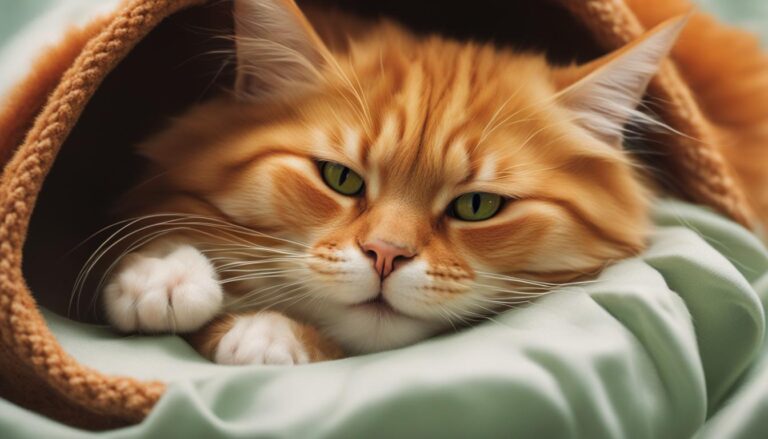Do cats fart? It’s a question that many cat owners have pondered. While it may seem like a silly or humorous topic, understanding feline flatulence can actually provide valuable insights into our feline friends’ digestive systems. In this article, we will delve into the world of cat farting, exploring the reasons behind it and what it could mean for your cat’s health.
Key Takeaways
- Cats do fart, as it is a natural byproduct of digestion.
- Excessive flatulence in cats can indicate underlying health issues.
- Certain breeds, like the Thai Lilac Cat, may be more prone to flatulence.
- Diet plays a significant role in feline flatulence, and certain foods can cause gas in cats.
- Monitoring your cat’s behavior, overall health, and litter box habits is crucial in managing flatulence.
The Science of Feline Flatulence: Understanding Why Cats Fart
Farting in cats is a natural process associated with digestion. Like humans, cats have a gastrointestinal system that breaks down food and produces gas. This gas is passed out of the body through the rectum. However, excessive flatulence in cats can be a sign of underlying health issues, and monitoring changes in farting habits is important.
The natural process of farting in cats is a result of gas production in their gastrointestinal system. When cats consume food, it travels through their esophagus and into the stomach. From there, it enters the small intestine where nutrients are absorbed, and finally, it reaches the large intestine where the remaining waste is processed.
During the digestion process, bacteria in the intestines break down the food, producing various gases as a byproduct. These gases include nitrogen, oxygen, carbon dioxide, methane, and hydrogen sulfide. Cats eliminate these gases by passing gas, which is a normal bodily function.
Excessive flatulence in cats can be a sign of underlying health issues.
Factors that can affect gas production in cats:
- Diet: Some foods can be harder to digest, leading to increased gas production.
- Food allergies or intolerances: Cats with sensitivities to certain ingredients may experience increased flatulence.
- Changes in diet: Sudden changes in diet can disrupt the balance of bacteria in the digestive system, leading to gas.
- Gastrointestinal issues: Inflammation, infections, or digestive disorders can cause excessive gas in cats.
If you notice a significant increase in your cat’s farting or if the flatulence is accompanied by other symptoms such as bloating, diarrhea, or a change in appetite, it is important to consult a veterinarian. They can help identify any underlying health issues and provide appropriate treatment.
| Cause of Flatulence | Symptoms |
|---|---|
| Dietary changes | Increased gas production, change in stool consistency |
| Food allergies or intolerances | Excessive flatulence, vomiting, diarrhea, skin irritation |
| Gastrointestinal issues | Excessive gas, bloating, diarrhea, weight loss, decreased appetite |
Understanding the science behind feline flatulence can help pet owners identify when their cats might need veterinary attention. By being attentive to their diet, monitoring any changes in behavior or symptoms, and seeking professional advice when necessary, you can help ensure that your furry friend maintains a healthy digestive system.
Uncovering the Mystery of Thai Lilac Cats: Traits and Characteristics
If you’re a cat lover, you may have heard about the intriguing Thai Lilac Cats. These unique feline companions are not only known for their striking appearance but also for their sensitive nature and distinctive vocalizations.
Thai Lilac Cats have a mesmerizing appearance with their short, smooth coats in shades of lilac, blue, and platinum, complemented by vibrant green eyes. Their lean and muscular build adds to their elegance, making them a popular choice for cat enthusiasts.
However, it’s not just their physical attributes that set Thai Lilac Cats apart. These felines have a reputation for being sensitive to their environment. They can develop easily upset stomachs, leading to flatulence. This sensitivity requires special care and attention to their diet and overall well-being.
In addition to their unique physical and behavioral traits, Thai Lilac Cats also have distinct vocalizations. Their expressive meows and purrs can convey a wide range of emotions, making them excellent communicators. It’s fascinating to observe and decipher these vocal cues to better understand their needs and desires.
| Traits of Thai Lilac Cats | Description |
|---|---|
| Appearance | Short, smooth coat in shades of lilac, blue, and platinum, vibrant green eyes, lean and muscular build |
| Sensitivity | Prone to easily upset stomachs, leading to flatulence |
| Vocalizations | Expressive meows and purrs, excellent communicators |
To provide the best care for your Thai Lilac Cat, it’s essential to be aware of their unique characteristics and needs. Understanding their sensitivity, monitoring their diet to minimize flatulence, and paying attention to their vocalizations will contribute to their overall well-being and ensure a harmonious companionship.
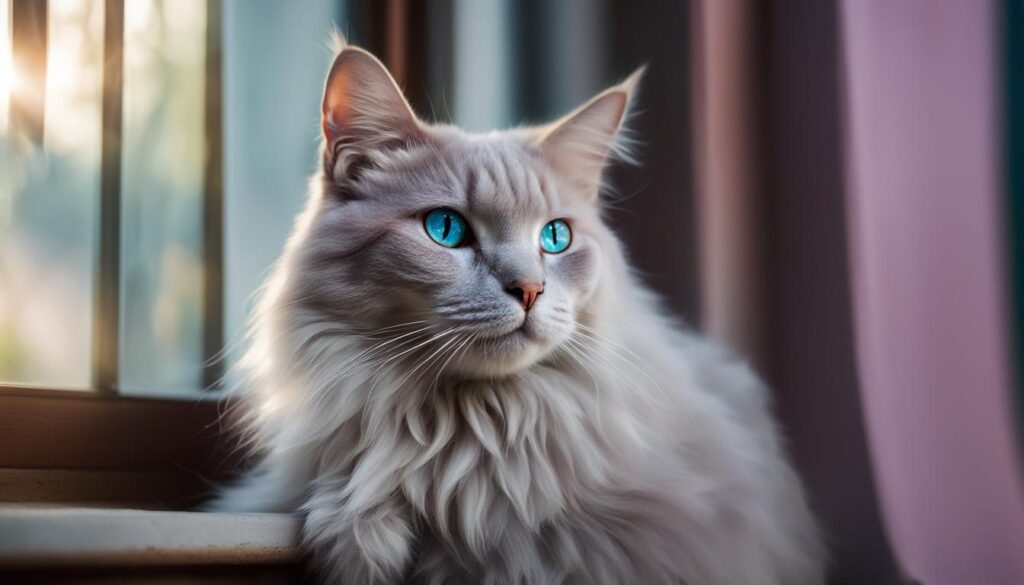
The Role of Diet in Feline Flatulence: Foods That May Cause Gas in Cats
Diet plays a significant role in feline flatulence. Certain foods can cause gas in cats, leading to increased flatulence. It’s important to be aware of these foods and make necessary adjustments to your cat’s diet to promote better digestive health.
Onions and garlic are common culprits that can cause gas in cats. These ingredients contain sulfur compounds that can be difficult for cats to digest, resulting in gas production. Similarly, beans and dairy products can also contribute to flatulence in cats. The complex carbohydrates found in beans and lactose in dairy can cause digestive issues and gas.
Low-quality cat food can also be a major factor in feline flatulence. These foods often contain fillers, artificial additives, and low-quality ingredients that are harder for cats to digest. It’s important to choose a high-quality cat food that is formulated to meet your cat’s nutritional needs and promotes healthy digestion.
When introducing new foods, it’s essential to do so gradually to allow your cat’s digestive system to adjust. Sudden diet changes can disrupt their digestion and lead to increased flatulence. Additionally, ensuring your cat stays hydrated by providing fresh water at all times can help maintain a healthy digestive system.
Foods that may cause gas in cats:
- Onions and garlic
- Beans
- Dairy products
- Low-quality cat food
By being mindful of your cat’s diet and making appropriate dietary adjustments, you can help minimize flatulence and promote better digestive health in your feline companion.
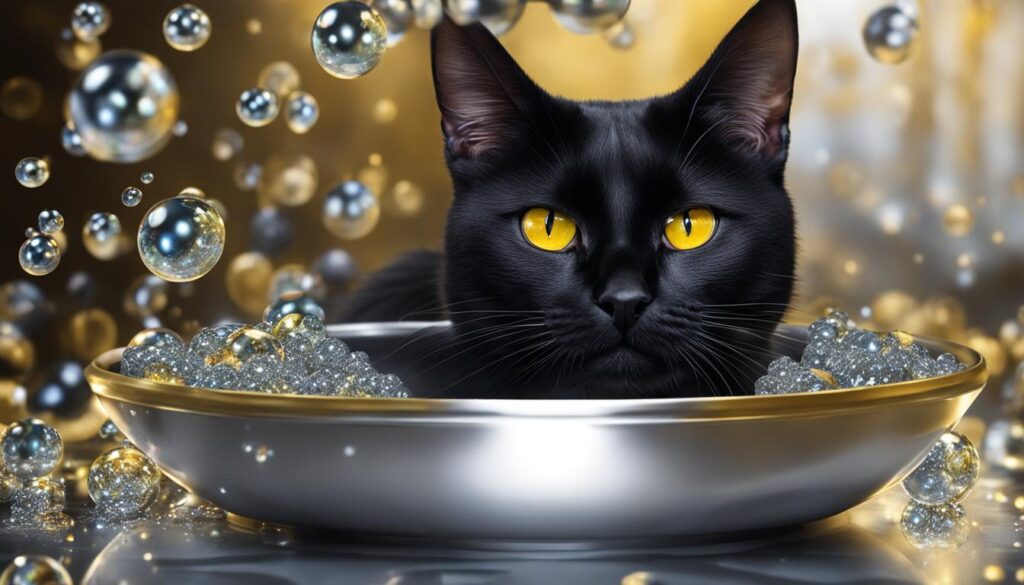
How to Deal with a Farting Cat: Tips for Pet Owners
If your cat is experiencing frequent flatulence, there are several steps you can take to manage this issue and improve their digestive health. Here are some helpful tips:
- Ensure a high-quality cat diet: Feeding your cat a well-balanced and nutritious diet is crucial for their overall health and can help alleviate flatulence. Opt for cat food that contains high-quality ingredients and is free from common allergens like grains or artificial additives.
- Feed smaller meals: Instead of giving your cat a large meal at once, try dividing their daily food into smaller, more frequent meals. This can help reduce the amount of gas produced during digestion and promote better overall digestion.
- Monitor cat behavior and health: Keep an eye on your cat’s behavior and overall health. If you notice any changes in their eating habits, litter box habits, or other unusual behaviors, it’s important to consult with your veterinarian. These changes could be indicators of underlying health issues that contribute to flatulence.
- Make changes in cat litter: Certain cat litters can emit strong odors that may exacerbate your cat’s flatulence. Consider switching to a low-dust and odor-control litter to create a more comfortable environment for your cat.
By following these tips and remaining attentive to your cat’s needs, you can effectively manage their flatulence and promote their overall digestive health. However, if the flatulence persists or is accompanied by other concerning symptoms, it’s always best to seek veterinary attention for a proper diagnosis and treatment.
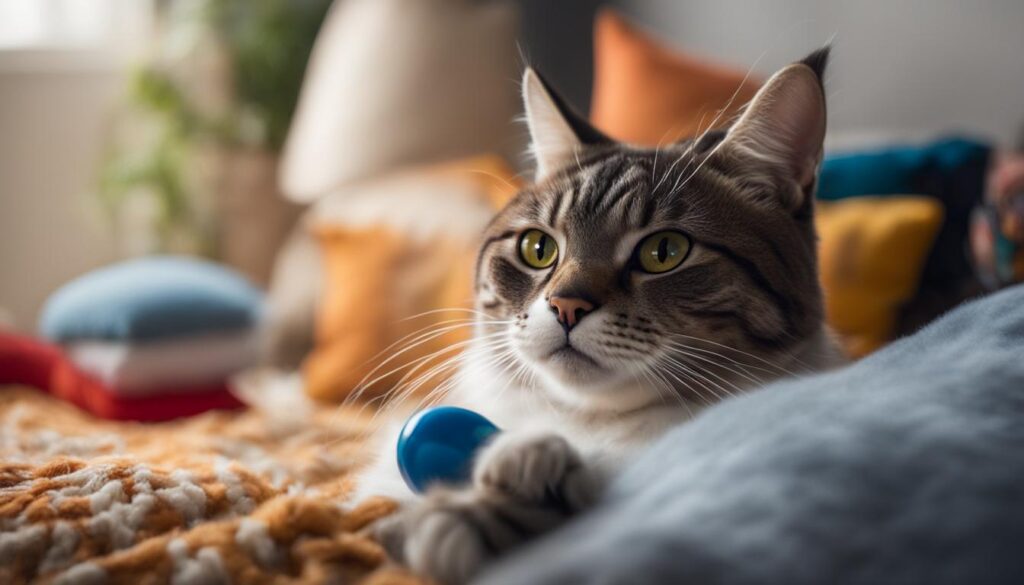
Expert Tip:
“Feeding your cat high-quality, easily digestible food and making dietary adjustments can go a long way in managing flatulence. Additionally, regular check-ups with your veterinarian can help identify any underlying health issues that may be contributing to your cat’s excessive farting.”
Remember, every cat is unique, and what works for one may not work for another. Take the time to understand your cat’s individual needs and consult with your veterinarian for personalized advice on managing their flatulence.
Health Implications of Excessive Farting in Cats: When to Seek Veterinary Attention
If your cat is experiencing excessive flatulence, it could be an indication of underlying health issues. While farting is a natural bodily function, persistent and foul-smelling flatulence in cats should not be ignored. It is important to understand the potential health implications and know when to seek veterinary attention.
Gastrointestinal issues can contribute to excessive flatulence in cats. Conditions such as infections, inflammation, or inflammatory bowel disease may cause gas to accumulate in the digestive system. Additionally, dietary issues, such as food intolerances or allergies, can also lead to excessive flatulence. If your cat is farting excessively and experiencing other symptoms like bloating, diarrhea, or loss of appetite, it is crucial to consult a veterinarian.
A veterinarian will be able to perform a thorough examination and determine the underlying cause of your cat’s excessive flatulence. They may recommend further diagnostic tests, such as blood work or imaging, to aid in the diagnosis. Treatment options will depend on the specific underlying health issue identified. In some cases, dietary changes or the introduction of supplements may be necessary to alleviate flatulence and promote digestive health.
When to Seek Veterinary Attention for Excessive Flatulence in Cats:
- If your cat is farting excessively and the flatulence is persistent
- If your cat’s flatulence is accompanied by other symptoms like bloating, diarrhea, or loss of appetite
- If your cat’s flatulence has a foul odor
- If your cat’s flatulence is accompanied by changes in behavior or overall health
Remember, as a responsible pet owner, it is important to monitor your cat’s health and behavior closely. Seeking veterinary attention for excessive flatulence can help identify and address any underlying health issues, ensuring your cat’s overall well-being.
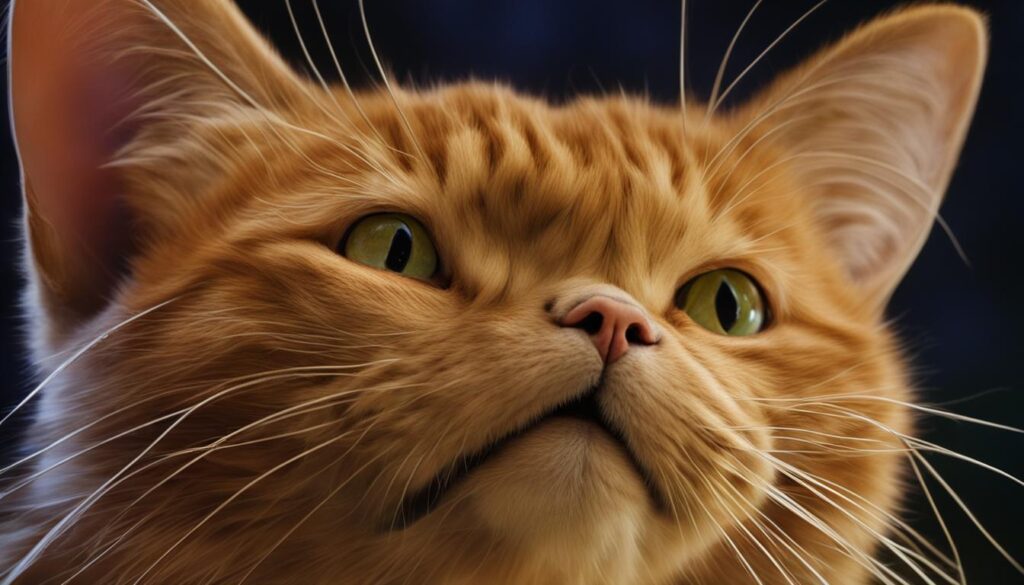
| Health Issue | Symptoms |
|---|---|
| Gastrointestinal issues | Excessive flatulence, bloating, diarrhea, loss of appetite |
| Dietary issues | Excessive flatulence, food intolerances or allergies |
Conclusion
Farting is a natural bodily function in cats, but it’s important to manage excessive flatulence for the overall health of your furry friend. By understanding the causes and taking proactive measures, you can prevent and alleviate cat flatulence.
One key aspect of managing cat flatulence is through their diet. Ensure your cat is receiving a high-quality and balanced diet to support their digestive system. Feeding smaller meals throughout the day and avoiding late-night meals can also help reduce flatulence.
Monitoring your cat’s behavior, overall health, and litter box habits is essential. If you notice persistent flatulence despite dietary adjustments, it is recommended to seek veterinary attention. Excessive or foul-smelling flatulence can be a sign of underlying health issues such as food intolerances, allergies, or gastrointestinal problems.
Remember, prevention is always better than cure. By being proactive in managing cat flatulence and addressing any health concerns promptly, you can ensure your beloved feline companion has a healthy and comfortable life.
